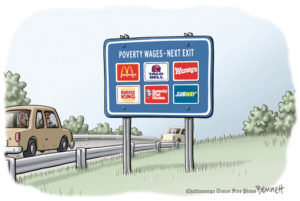Fast Food Workers Super Size Their Walkout
Fast food workers demanding a livable wage of $15 an hour are pushing for a nationwide walkout Aug. 29, leading, fittingly enough, into Labor Day weekend.
Fast food workers demanding a livable wage of $15 an hour are pushing for a nationwide walkout Aug. 29, leading, fittingly enough, into Labor Day weekend.
The campaign, which began in New York City in March and has since spread sporadically to other cities, is aimed at lifting wages from what organizers say is a median of less than $9 an hour, an unlivable level just about anywhere in the country. More significantly, they also seek protections for workers seeking to organize unions at the worksites.
The targets are the biggest and best-known chains, including McDonald’s, Burger King, Wendy’s and KFC, among others. It’s unclear whether they include chains such as the California-based In-N-Out Burger, which pays a starting wage of $10.50 an hour, or stand-alones like Detroit’s Moo Cluck Moo, which pays workers $12.
“I wasn’t tuned in to the whole living-wage movement,” Moo Cluck Moo co-founder Harry Moorhouse recently told The Daily Beast. “We just felt that, for a variety of reasons, it was the right thing to do.” And it’s been effective at supporting worker morale and job performance. “What we found is that they are much more tuned in to their jobs. They work a lot more efficiently. They take direction pretty easily.”
Earlier walkouts met with mixed success, but did gain workers a national stage with significant major-media coverage. How much attention this national call will receive from local and regional media could help determine how effective the campaign becomes. Interestingly, the campaign — like the Wal-Mart organizing drive — seems guided by union activists outside the traditional union structure. If it works, this could offer guidance on more effective organizing strategies for unions, which have been pummeled in the private sector for years.
These fast food workers are not teenagers trying to pick up some pocket cash or set aside money for college. Most are adults mired among the ranks of the working poor. Willietta Dukes, 39, told The Washington Post that she has worked at a Burger King in Durham, N.C., for 15 years, and the most she has earned is $8.65 an hour — a poverty wage for the mother of two — for workweeks that rarely total 40 hours.
“I have been watching on TV, and I have seen a lot of people forming around the country, striking for better wages and to have their voices heard. I think it is high time that I did something,” Dukes told the Post. “I work hard. I don’t sit around. I am good at what I do. Yet after working all day, I do not earn enough to even pay for the basics. I don’t want to be in poverty forever.”
— Posted by Scott Martelle.
Your support matters…Independent journalism is under threat and overshadowed by heavily funded mainstream media.
You can help level the playing field. Become a member.
Your tax-deductible contribution keeps us digging beneath the headlines to give you thought-provoking, investigative reporting and analysis that unearths what's really happening- without compromise.
Give today to support our courageous, independent journalists.






You need to be a supporter to comment.
There are currently no responses to this article.
Be the first to respond.